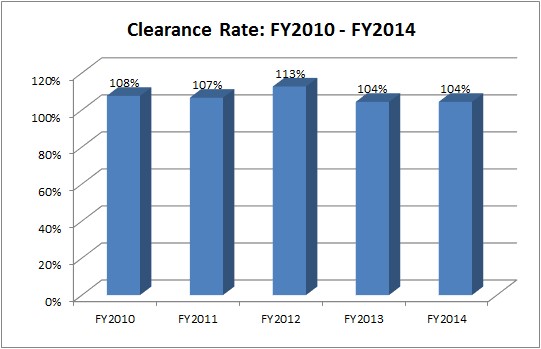The Utah Supreme Court is the highest state court and, as such, the court of last appeal in Utah. The Supreme Court is located in the Scott M. Matheson Courthouse. The Court hears appeals from capital and first degree felony cases and all District Court civil cases except for cases regarding domestic relations. The Supreme Court has jurisdiction over judgments of the Court of Appeals by writ of certiorari, constitutional and election questions, proceedings of the Judicial Conduct Commission, and lawyer discipline.
Five justices sit on the Supreme Court for ten-year renewable terms. The justices elect a chief justice by majority vote to serve for four years, and an associate chief justice to serve for two years.
During the 2015 General Session, the Legislature appropriated for Fiscal Year 2016, $3,053,000 from all sources for Supreme Court. This is a 3.5 percent increase from Fiscal Year 2015 revised estimated amounts from all sources. The total includes $3,044,900 from the General/Education Funds, an increase of 3.5 percent from revised Fiscal Year 2015 estimates.
The Supreme Court is guided by various performance measures. One primary metric used to measure performance is the clearance rate - the number of cases processed versus the number of new cases that are submitted to the Court. Below is the clearance rate reported annually which shows a rate above 100% since CY 2008.

The Supreme Court has original jurisdiction to answer questions of state law certified from Federal Courts and to issue extraordinary writs. The Supreme Court reviews formal administrative proceedings of the Public Service Commission, Tax Commission, School and Institutional Trust Lands Board of Trustees, Board of Oil, Gas, and Mining, and the State Engineer.
The court adopts rules of civil and criminal procedure and rules of evidence used in state courts. The Supreme Court manages the appellate process and governs the practice of law, including admissions to practice law.
Justices are assisted by law clerks, staff attorneys, a clerk of the court, and a staff of legal secretaries and deputy court clerks. Staff attorneys screen the cases and the Appellate Court Administrator is responsible for the court operations.
COBI contains unaudited data as presented to the Legislature by state agencies at the time of publication. For audited financial data see the State of Utah's Comprehensive Annual Financial Reports.